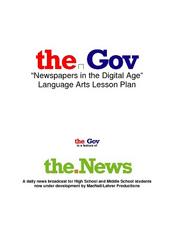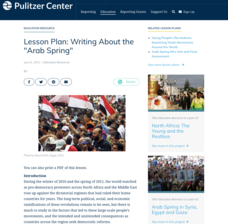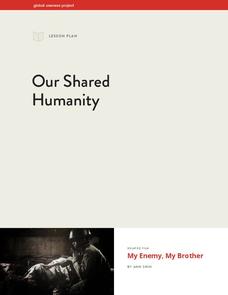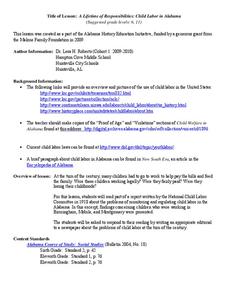Curated OER
Newspapers in the Digital Age
Is journalism more or less reliable with the influx of Internet sources? Learners investigate the issues of freedom of speech, journalistic ethics, and social responsibility in the age of Twitter and Facebook. After examining the...
Pulitzer Center
Writing About the "Arab Spring"
An information-rich resource, this webpage will provide your class with all the information they need to explore a relevant real-world and little understood topic: the Middle East and the people's revolutions that shook it in the spring...
BioEd Online
Arm Model
Arm your young scientists with knowledge about anatomy as they build their own model of the elbow joint. Help them get a firm grasp on how muscles and bones interact to allow movement as they try different positions for the muscles on...
Anti-Defamation League
Gossip, Rumors and Identity
A thoughtful discussion prompts middle schoolers to reflect on gossip and rumors, what they are, their experience with them, and how some groups experience it more than others. Scenarios challenge participants to consider the impact of...
Center for History and New Media
The Impact of the Jim Crow Era on Education, 1877–1930s
Even though American slaves were officially emancipated in 1865, the effects of slavery perpetuated throughout the 19th and 20th centuries. Middle and high schoolers learn about the ways that discrimination and the Jim Crow laws...
BioEd Online
Bone Structure: Hollow vs. Solid
What is meant by the phrase "form follows function?" Allow your budding biologists to discover first-hand through two activities. In the first, groups work together to discover whether a solid cylinder or an empty cylinder can support...
BioEd Online
Muscle Fibers
What better way to learn about muscle than by dissecting one? Using cow muscle (beef), learners compare bundles of yarn to muscle fibers as they explore each. The supplemental reading about astronauts losing muscle mass in space and what...
KOG Ranger Program
The Value of Oregon’s Forests
No matter where you go, you're in the middle of a forest in some way. Use a lesson about forests and the many ways they contribute to our world, including the ecosystems of animals and plants living in their shady soil.
Center for History and New Media
Slavery and Free Negroes, 1800 to 1860
What was life like for enslaved and free black people before the American Civil War? Explore the building tension between states and the freedom of individuals with a thorough social studies lesson. Learners of all ages explore primary...
US Holocaust Museum
Time Capsule in a Milk Can
Imagine dumping out a milk can and finding letters from one of the darkest moments in history! Scholars use Holocaust Reading Passages and research to discover how people recorded and hid history during the events of World War II. They...
Curated OER
Courage: Hero Traits
What does it mean to be a hero? Who qualifies as a hero? In groups, middle and high schoolers brainstorm a list of heroes and create a list of characteristics that a person must possess in order to be a hero. Extend this lesson by having...
Smithsonian Institution
Students’ Response to 9/11—A Documentary Report
Young historians research the devastating attacks of 9/11 and use that information to script their own documentaries. The follow-up activity includes recording the documentary and conducting classmate interviews,
Baylor College
Energy for Life (Energy from Food)
Energy comes in many forms, but how do living things get the energy they need to survive and thrive? In a simple, controlled experiment with yeast, water, and sugar, groups make observations about how yeast reacts with water alone, then...
Global Oneness Project
Our Shared Humanity
Ann Shin's award-winning documentary, My Enemy, My Brother introduces viewers to Zahed Haftlang and Najah Aboud, two child soldiers on opposite sides during the Iran-Iraq war. After viewing the film, class members are asked to reflect on...
US Holocaust Museum
Remember the Children: Daniel’s Story
Imagine being a child forced from your home and into a concentration camp during World War II. Scholars prepare for a visit to the United States Holocaust Museum by researching the children of the horrible event. They analyze...
Curated OER
"The Gambler" and "The Journey": A Comparison of Worlds in Two Short Stories
“The Gambler” and “The Journey” offer readers an opportunity to experience two very different views of Jewish life in Poland between WWI and WWII. Whether used as a part of a study of the Holocaust, or as a compare/contrast exercise, the...
Alabama Department of Archives and History
A Lifetime of Responsibilities: Child Labor in Alabama
Imagine children working long hours in factories, coal mines, and in the fields. Class members examine a series of pictures and read about early attempts to regulate child labor and current child labor laws.
Scholastic
Frindle Lesson Plan
"Who says a pen has to be called a pen? Why not call it a frindle?" Inspired by this quote from the award-winning novel written by Andrew Celements, this lesson allows children to invent their own terms for common classroom objects,...
Candace Fleming
Ben Franklin’s Almanac: Being a True Account of the Good Gentleman’s Life
Candace Fleming's award winning Ben Franklin's Almanac is the anchor text for a classroom guide that provides teachers with a cache of pre, during, and post-reading activities.
Curated OER
Bill Robinson: Mr. Bojangles
Mr. Bojangles was born just after slavery was abolished and became one of the most beloved entertainers of his time. Explore key vocabulary, the life of an African-American entertainer, and the impact of the Harlem Renaissance on...
Curated OER
Seashell Painting
Let nature inspire your budding artists. They paint seascapes on actual seashells. First, they observe the seaside, then they paint what they see (image or in person) on the inside of a white shell.
Other popular searches
- High Middle Ages Guild
- High Middle Ages Learning
- High Middle Ages Period
- Economy High Middle Ages
- High Middle Ages Eguiled
- High Middle Ages Guiled
- High Middle Ages \ Guild
- High Middle Ages \ Eguiled
- High Middle Ages +Guild
- High Middle Ages +Eguiled
- High Middle Ages \+Guild






















